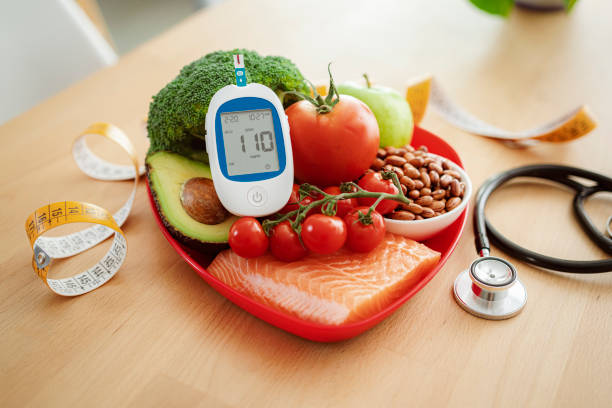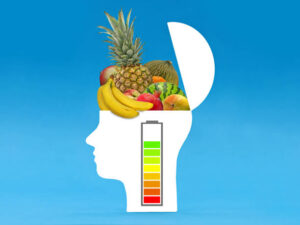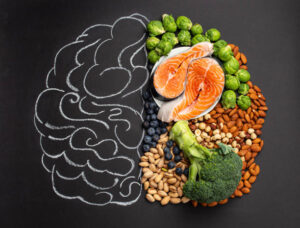The vegan diet for diabetes, which emphasizes plant-based whole foods, has emerged as a promising approach to managing the condition. It’s rich in fiber, low in unhealthy fats, and naturally packed with antioxidants, making it ideal for those seeking better blood sugar control and improved insulin sensitivity.
What is Diabetes?
Diabetes, a health condition that affects millions worldwide, is a condition where the body struggles to maintain healthy blood sugar levels due to problems with insulin production or usage.
With its potential complications, such as nerve damage, kidney issues, and cardiovascular diseases, managing diabetes is a priority for many. One of the most effective ways to take control of diabetes is through diet, as the foods we eat directly impact blood sugar levels and overall health.
There are three main types:
- Type 1 Diabetes: An autoimmune condition where the body doesn’t produce insulin.
- Type 2 Diabetes: The most common form often linked to insulin resistance and lifestyle factors.
- Gestational Diabetes: A temporary condition during pregnancy that can increase the risk of developing Type 2 diabetes later.
Proper blood sugar management is critical for preventing complications, and diet plays a starring role in achieving this.
Common Challenges in Managing Diabetes
Managing diabetes often feels like walking a tightrope. Balancing blood sugar levels, dealing with insulin resistance, and avoiding long-term complications are constant concerns. Many struggle with choosing the right foods, maintaining a healthy weight, and staying consistent with a healthy lifestyle.
One of my clients, Sarah, shared how she was overwhelmed when her doctor recommended major dietary changes. She felt lost navigating food labels and determining what worked for her blood sugar. That’s when we introduced her to a simple, plant-based plan, transforming her health without feeling restrictive.
How a Vegan Diet Supports Diabetes Management
Nutritional Profile of a Vegan Diet
Apart from being environmentally friendly, a vegan diet has several qualities that make it particularly effective for diabetes management:
- High Fiber Content: Foods like vegetables, legumes, and whole grains have high fiber, which slows glucose absorption and minimizes blood sugar spikes.
- Plant-Based Proteins: Options like lentils, tofu, and tempeh offer protein without the saturated fats in animal products, which can exacerbate insulin resistance.
- Antioxidants and Anti-Inflammatory Compounds: Phytonutrients in fruits and vegetables combat inflammation, a key factor in diabetes progression.
Evidence-Based Benefits
- Improved Insulin Sensitivity: Research has shown that plant-based diets can improve how the body responds to insulin. A vegan diet’s emphasis on nutrient-dense foods can help with weight loss, a critical factor in managing Type 2 diabetes.
- Heart Health: Plant-based diets are naturally low in cholesterol and saturated fats, reducing the risk of heart disease, a common complication of diabetes.
Building a Diabetes-Friendly Vegan Diet
Key Components
Creating a balanced vegan diet for diabetes involves focusing on nutrient-rich foods:
- Low Glycemic Index Foods: Opt for quinoa, lentils, and sweet potatoes, which release glucose slowly into the bloodstream.
- Complex Carbohydrates: Whole grains like oats and farro provide lasting energy without spiking blood sugar.
- Healthy Fats: Nuts, seeds, avocados, and olive oil support heart health and stabilize blood sugar levels.
- Lean Plant-Based Proteins: Incorporate tofu, tempeh, and legumes for sustained energy and satiety.
Foods to Avoid or Limit
While vegan diets can be healthy, some foods should be limited:
- Processed Vegan Snacks: Items like vegan cookies or chips often contain added sugars.
- Refined Carbohydrates: White bread and rice can cause rapid blood sugar spikes.
- Saturated Fats: Some vegan desserts made with coconut oil can be high in saturated fat, which affects insulin sensitivity.
Practical Tips for Success
Meal Planning and Preparation
Planning meals is a game-changer. Create balanced meals with a mix of proteins, fats, and carbohydrates. Batch cooking soups, stews, and grain bowls can save time and ensure you always have diabetes-friendly options.
One of my go-to meals is lentil soup with a side of quinoa salad—it’s hearty, nutritious, and keeps my energy steady throughout the day.
Reading Labels
When shopping, check for hidden sugars and refined carbohydrates in packaged vegan foods. Look for terms like “high-fructose corn syrup” or “evaporated cane juice.” Choose fortified foods to ensure you get essential nutrients like vitamin B12 and calcium.
Monitoring Blood Sugar Levels
Regular glucose testing can help you identify which vegan or plant-based foods work best for your body. Adjust meals as needed to maintain stable blood sugar levels. For example, swapping out white rice for farro or brown rice can make a big difference.
Top 10 Vegan Foods for Diabetes
1. Leafy Greens
Examples: Spinach, kale, Swiss chard
Why They Help:
Leafy greens are low in carbohydrates, meaning they won’t cause significant blood sugar spikes. They’re also packed with essential nutrients like magnesium and vitamin K, which play roles in insulin sensitivity and glucose metabolism. Antioxidants in these greens, such as lutein and zeaxanthin, protect against oxidative stress—a common issue in diabetes that can lead to complications.
Pro Tip: Add a handful of spinach to your morning smoothie or sauté kale with garlic for a diabetes-friendly side dish.
2. Lentils and Legumes
Examples: Chickpeas, black beans, lentils
Why They Help:
These plant-based proteins are rich in fiber, which slows digestion and prevents rapid blood sugar fluctuations. Lentils, for instance, have a low glycemic index (GI), making them an excellent choice for sustained energy. Additionally, legumes are high in resistant starch—a carbohydrate that feeds beneficial gut bacteria and improves overall insulin sensitivity.
Pro Tip: Enjoy a lentil curry or add chickpeas to salads for a hearty and satisfying meal.
3. Nuts and Seeds
Examples: Almonds, walnuts, chia seeds, flaxseeds
Why They Help:
Rich in healthy fats, protein, and fiber, nuts and seeds help stabilize blood sugar and improve satiety, reducing the likelihood of overeating. For instance, walnuts contain alpha-linolenic acid (ALA), a type of omega-3 fatty acid that supports heart health—especially important for diabetics prone to cardiovascular issues. Chia seeds and flaxseeds also contain soluble fiber, which slows glucose absorption.
Pro Tip: Sprinkle chia seeds on oatmeal or snack on a handful of almonds to curb cravings between meals.
4. Whole Grains
Examples: Quinoa, oats, brown rice, farro
Why They Help:
Whole grains are unrefined and packed with fiber, vitamins, and minerals. Quinoa, for instance, is a complete protein, making it ideal for maintaining muscle mass while managing blood sugar. Oats contain beta-glucan, a soluble fiber shown to lower blood sugar and cholesterol levels. Their low GI ensures a gradual release of glucose into the bloodstream.
Pro Tip: Start your day with a bowl of steel-cut oats topped with berries for a balanced, diabetes-friendly breakfast.
5. Berries
Examples: Blueberries, strawberries, raspberries
Why They Help:
Berries are nature’s candy with a low glycemic load. They’re high in fiber, moderate sugar absorption, and are packed with antioxidants like anthocyanins that reduce inflammation and improve insulin sensitivity. Studies have shown that regular consumption of berries may help lower HbA1c levels, a key marker for long-term blood sugar control.
Pro Tip: Enjoy a berry parfait with unsweetened plant-based yogurt as a refreshing snack.
6. Non-Starchy Vegetables
Examples: Broccoli, cauliflower, zucchini, bell peppers
Why They Help:
Low in calories and carbohydrates, non-starchy vegetables are excellent for filling up without affecting blood sugar. Vegetables like broccoli and cauliflower are also rich in sulforaphane, a compound with potential blood sugar-lowering and anti-inflammatory effects. Their high water and fiber content help with digestion and weight management, which are critical for Type 2 diabetes.
Pro Tip: Make a stir-fry with a medley of these vegetables for a colorful, nutrient-dense dish.
7. Tofu and Tempeh
Examples: Firm tofu, fermented tempeh
Why They Help:
These soy-based foods are fantastic sources of plant-based protein and contain minimal carbohydrates. Tofu is a versatile ingredient that absorbs flavors well, while tempeh offers added benefits due to its fermentation, which supports gut health. Both help regulate blood sugar levels and are ideal for maintaining a balanced diet.
Pro Tip: Marinate and grill tofu or use tempeh in tacos for a protein-packed meal.
8. Avocados
Why They Help:
Avocados are a unique fruit loaded with heart-healthy monounsaturated fats, which reduce bad cholesterol (LDL) and improve insulin sensitivity. Their fiber content further aids in blood sugar regulation, and they provide essential nutrients like potassium, which supports healthy blood pressure—a key concern for diabetics.
Pro Tip: Mash avocado on whole-grain toast with chia seeds for a satisfying breakfast.
9. Sweet Potatoes
Unlike regular potatoes, sweet potatoes have a lower glycemic index and are rich in dietary fiber, which slows glucose release. They’re also packed with vitamins A and C and antioxidants that combat inflammation. For diabetics, sweet potatoes offer a nutrient-dense, satisfying alternative to higher-GI starches.
Pro Tip: Roast sweet potato wedges with a drizzle of olive oil and cinnamon for a flavorful side dish.
10. Plant-Based Unsweetened Milk Alternatives
Examples: Almond milk, soy milk, oat milk
Why They Help:
Many dairy products contain natural sugars like lactose, which can elevate blood sugar levels. Unsweetened plant-based milks are a lower-sugar alternative while still providing essential nutrients like calcium and vitamin D. Soy milk, in particular, is rich in protein and has been linked to improved cardiovascular health.
Pro Tip: Use unsweetened almond milk in smoothies or soy milk in coffee for a diabetes-friendly drink option.
Vegan Diet for Diabetes: Conclusion
A vegan diet for diabetes offers clear benefits. Fiber-rich foods like legumes, whole grains, and non-starchy vegetables help regulate blood sugar, enhance insulin sensitivity, and aid in maintaining a healthy weight. Healthy fats and antioxidants from nuts, seeds, and leafy greens reduce inflammation and lower the risk of diabetes-related complications, including heart disease.
To maximize these benefits, it’s crucial to tailor your diet to your individual needs. Working with a healthcare provider or registered dietitian ensures your meals are balanced, meet your nutritional requirements, and avoid common pitfalls like excessive carbohydrates or nutrient deficiencies.
A well-planned vegan diet is more than a strategy for diabetes—it’s a sustainable path toward better health and well-being. With the right support, plant-based eating can empower you to take control of your diabetes and thrive.
FAQs
1. Can a vegan diet reverse Type 2 diabetes?
While a vegan diet may not “cure” diabetes, it can improve insulin sensitivity and, in some cases, lead to remission of Type 2 diabetes through weight loss and improved blood sugar control.
2. Are all vegan foods safe for diabetics?
No, processed vegan foods like cookies or chips often contain added sugars. Focus on whole foods like vegetables, legumes, and grains.
3. How do I meet my protein needs on a vegan diet?
Include foods like lentils, tofu, tempeh, and quinoa in your meals to ensure adequate protein intake.
4. Can I follow a vegan diet if I have Type 1 diabetes?
Yes, but it’s essential to monitor blood sugar closely and work with a dietitian to maintain a balanced diet.
5. What supplements should I take on a vegan diet for diabetes?
Common supplements include vitamin B12, omega-3 fatty acids, and vitamin D. Speak with a healthcare provider to determine your needs.







